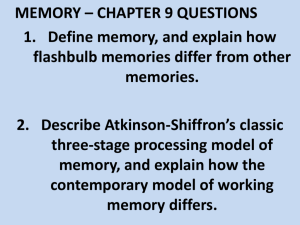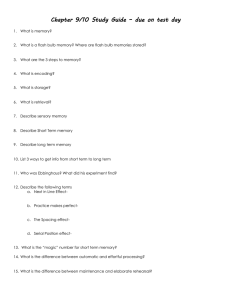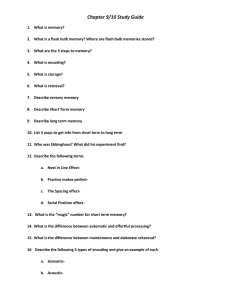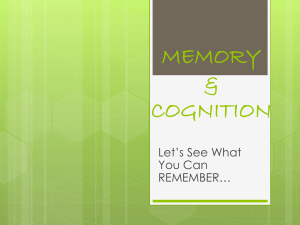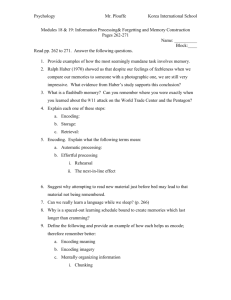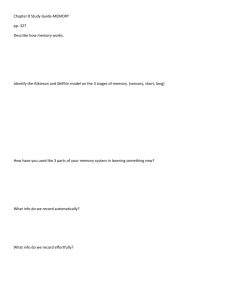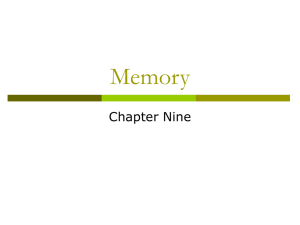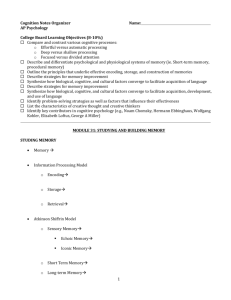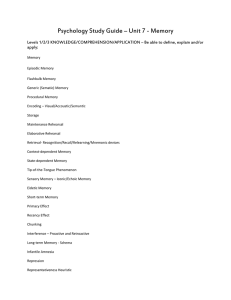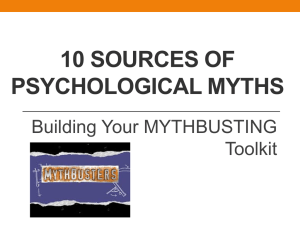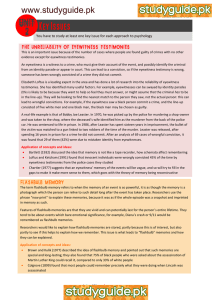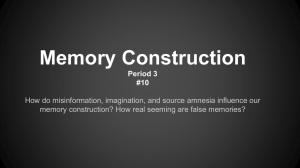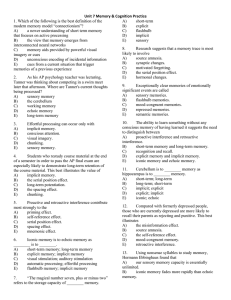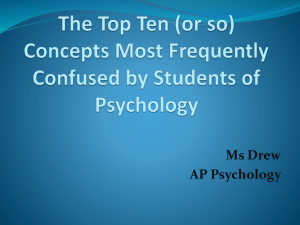Guided Notes
advertisement
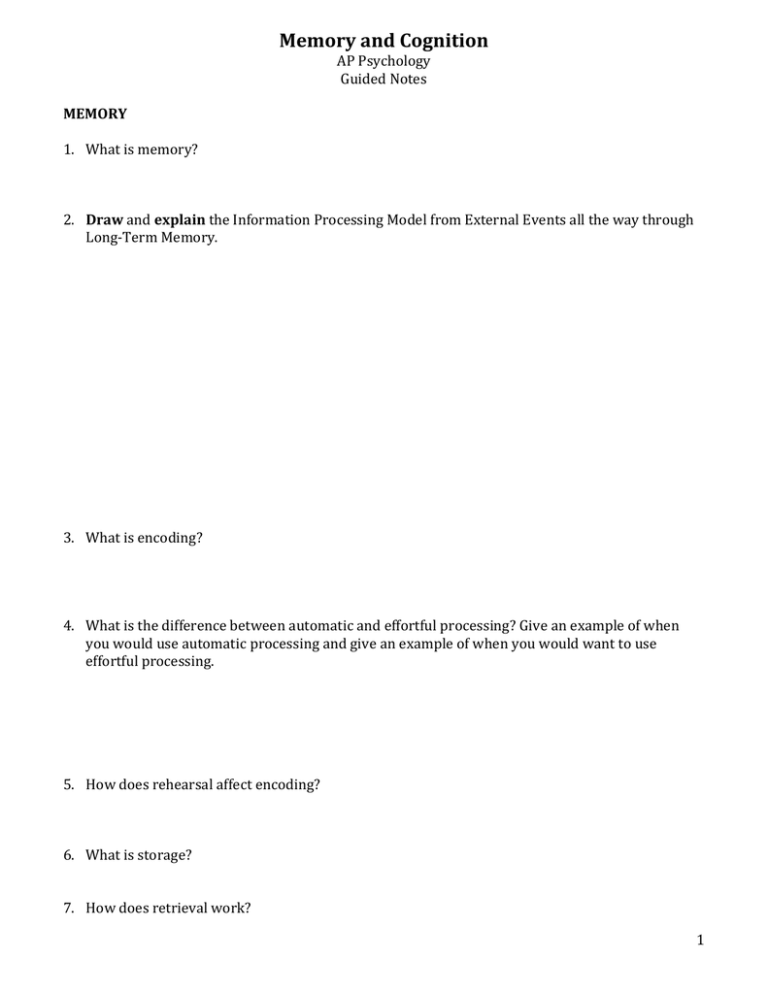
Memory and Cognition AP Psychology Guided Notes MEMORY 1. What is memory? 2. Draw and explain the Information Processing Model from External Events all the way through Long-Term Memory. 3. What is encoding? 4. What is the difference between automatic and effortful processing? Give an example of when you would use automatic processing and give an example of when you would want to use effortful processing. 5. How does rehearsal affect encoding? 6. What is storage? 7. How does retrieval work? 1 8. Complete this chart Sensory Short Term/Working Long Term Length of time Capacity (amount) What factors affect it (if anything)? 9. How many pieces of information (according to Ebbinghaus) can we keep in our working memory? Why are telephone numbers and social security numbers divided the way that they are? 10. Complete this chart Procedural Emotional Semantic Episodic Iconic Echoic Explanation Example 11. How do effortful versus automatic processing affect our memories? 12. What is the self-reference effect? Why does this help you remember psychology? 13. Explain Miller’s working memory forgetting curve. How many piece of information can humans hold in their working memory? 2 14. How does chunking help you remember more? 15. How do mnemonics work? Give an example. 16. Based upon the readings regarding the testing effect and the spacing effect, explain why does Mrs. Lesniewicz give tests all the time. 17. What is shallow versus deep processing? Based upon this information, why is copying someone’s guided notes a bad idea? 18. What role do each of these brain structures play in memory: a. Hippocampus b. Cerebellum c. Basal ganglia d. Amygdala e. Frontal lobe 19. What are flashbulb memories? What role does the amygdala play in flashbulb memories? How 20. What is long term potentiation (LTP)? How does Alzheimer’s disease fit into LTP? 21. What is recall? What kind of test question asks for recall? 3 22. What is recognition memory? What kind of test question asks for recognition? 23. How is studying for the AP exam an example of relearning? 24. What are retrieval cues? 25. Who was Hermann Ebbinghaus? Why was he important? 26. How do priming and context affect your memory? 27. What is state dependent memory? What is context dependent learning? 28. Draw and explain the serial positioning curve. 29. What are the primary and recency effects? 4 30. Explain the differences between visual, acoustic, and semantic encoding. Which one is the best? Why? 31. What is anterograde amnesia? What can you remember? What do you forget? Give a famous example. 32. What is retrograde amnesia? What can you remember? What do you forget? Give a famous example. 33. What are encoding failures? How do they affect memory? 34. How does storage decay affect memory? What does Ebbinghaus say about how time affects your ability to speak your high school Spanish? 35. What is a retrieval failure? 36. Explain how concrete versus abstract terms are more easily retrieved from memory. 37. What is interference? 38. What is proactive interference? Give an example. 39. What is retroactive interference? Give an example. 5 40. How does motivated forgetting work? 41. What is repression? Do you believe in it? 42. Explain intrusion. 43. How do you construct your memories? 44. Explain Elizabeth Loftus’s research. 45. What is the misinformation effect? Give an example on how that would affect memory. 46. Explain source amnesia. 47. How does source amnesia explain déjà vu? 48. How do we judge the accuracy of our own memories? 6 49. How good is eyewitness memory? How good is children’s eyewitness memory in particular? 50. What are some ways you can improve your memory? THINKING, PROBLEM-SOLVING AND CREATIVITY 1. What is cognition? 2. What are concepts? How do form them? How do prototypes create our concepts? Draw an example of a prototype and what concept it represents. 3. What is creativity? 4. Explain the differences between convergent and divergent thinking. Give an example of each. 5. What does Sternberg say about becoming more creative? 6. When you are problem solving, what is an algorithm? How effective (fast and accurate) is it? Give an example of when you would use an algorithm. 7 7. How effective (fast and accurate) are heuristics? Are they right all the time? Give an example when a heuristic would be a good strategy. 8. How does insight help you problem solve? Can you count on it? 9. How does confirmation bias affect your problem solving? 10. How do fixation, mental set, and functional fixedness affect problem solving? 11. What is the representativeness heuristic? How does it affect your judgments and decisionmaking? Give an example of the representativeness heuristic. 12. How does the availability heuristic affect your decision-making? Give an example of the availability heuristic. 8 13. Are people accurate in their assessments of how correct they are? What is that called? 14. What is belief perseverance? 15. Explain the good, the bad, and the ugly of intuition. 16. How does framing affect problem solving and judgment? 9
